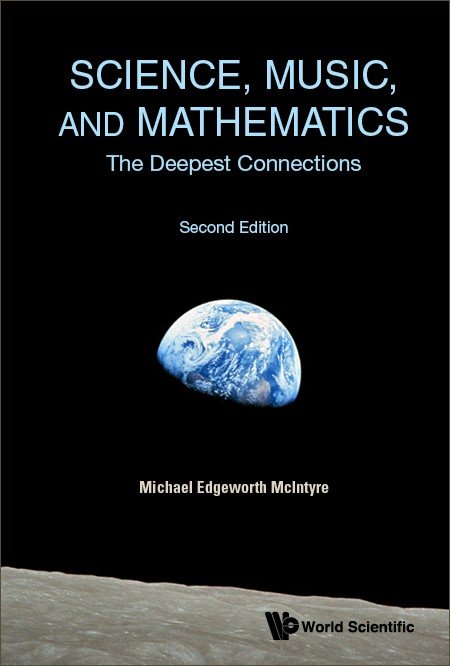Professor Michael Edgeworth McIntyre is an eminent scientist who has also had a part-time career as a musician. In this book he offers an extraordinary synthesis, revealing the many deep connections between science, music, and mathematics. He avoids equations and technical jargon. The connections are deep in the sense of being embedded in our very nature, rooted in biological evolution over hundreds of millions of years.
Michael guides us through biological evolution, perception psychology, and even unconscious science and mathematics, all the way to the scientific uncertainties about the climate crisis.
He also has a message of hope for the future. Contrary to popular belief, he holds that biological evolution has given us not only the nastiest, but also the most compassionate and cooperative parts of human nature. This insight comes from recognizing that biological evolution is far more than a simple competition between selfish genes. Instead, he argues, in some ways it is more like the turbulent, eddying flow in a river or in an atmospheric jet stream, a complex process spanning a vast range of timescales.
Professor McIntyre is a Fellow of the Royal Society of London (FRS) and has long been interested in how different branches of science can better communicate with each other, and with the public. His work harnesses aspects of neuroscience and psychology that point toward the deep 'lucidity principles' that underlie skilful communication, principles related to the way music works — music of any genre.
This Second Edition sharpens the previous discussion of communication skills and their importance for today's great problems, ranging from the widely discussed climate crisis to the need to understand the strengths and weaknesses of artificial intelligence.
Sample Chapter(s)
Foreword by Herbert E. Huppert FRS
Preface to the second edition
1: The unconscious brain
Contents:
- Foreword by Herbert E Huppert FRS
- Preface to the Second Edition
- About the Author
- The Unconscious Brain
- What is Lucidity? What is Understanding?
- Mindsets, Evolution, and Language
- Acausality Illusions, and the Way Perception Works
- What is Science?
- Music, Mathematics, and the Platonic
- Postlude: The Amplifier Metaphor for Climate
- References and Endnotes
- Index
Readership: Young scientists in academia: undergraduate and graduate; students, and postdoctoral researchers. Also more senior scientists and mentors, and a general readership of scientifically-minded lay persons, as well as Musicians interested in scientific aspects of music.
"The first edition of Michael Edgeworth McIntyre's book rightly received plaudits for its insightfulness, clarity of thought, unique approach and explanation of cross-cutting topics in science, music and mathematics. One of its highlights, for me as an atmospheric phycicist, was the Postlude 'The amplifier metaphor for climate' which discusses how the climate system can respond significantly to small changes in inputs, such as solar energy, and how these are magnified by the greater availability of 'fuel' in the form of water vapour associated with human-produced global warming. In the second edition this discussion is augmented by sections on the evidenced increase in occurrence of extreme weather events and the physics behind the possibility of climate tipping points. A key theme of the book is the clear-headed objectivity needed in communicating complex scientific results to non-specialists, both to support policymakers in acting on climate change and to call out those who try to distort such information. Michael's writing exemplifies how such clarity can be achieved without detracting from a really good read."
Professor Joanna D Haigh
Faculty of Natural Sciences, Department of Physics, Imperial College London
"Michael Edgeworth McIntyre is one of the world leading researchers on the fluid dynamics of our climate system. As such he an expert on the mathematical nature of our home, Planet Earth. But remarkably, were it not for the flap of a butterfly's wings, he may have become a professional classical violinist. In this remarkable book, McIntyre weaves together these three themes — science, music, and mathematics — into a unified whole. The result is a lucid and unique discussion, buzzing with infectious enthusiasm, of the deep interrelationships between the arts and the sciences. The book should appeal to anyone interested in what makes us the creative species we are."
Professor Timothy Palmer CBE FRS
Author of The Primacy of Doubt;
Royal Society Research Professor in Climate Physics, Senior Alumni Fellow, Oxford Martin Institute;
Professorial Fellow at Jesus College, University of Oxford
"This book superbly reflects its author in its intellectual depth and breadth, and in its clarity and enthusiasm. It is a book to be read by all, but particularly by young scientists, as it gives a clarion call for them to play their vital role in the quest to help our species thrive in a sustainable manner on this planet."
Professor Sir Brian John Hoskins, CBE FRS
Faculty of Natural Sciences, The Grantham Institute for Climate Change, Imperial College, London;
Professor in Meteorology, University of Reading
Reviews of the First Edition:
"In this book, the author takes us on a delightful, challenging, and inviting romp through the playgrounds of his mind, introducing us to a diverse range of topics that have caught his fancy and considerable attention during his long career as a research scientist, presenting, connecting and relating them in new and intriguing ways, with depth, clarity, lucidity, magnetism, relevance, and delightful humor … It's for truly inquiring minds — scientific, musical, mathematical, technical, and engineering — and for them, it's a must read."
Professor William Simmons
Oceanographer (Retired)
"The adjective 'rare' is so often misused in our modern language. This book by Michael Edgeworth McIntyre, however, is a truly rare addition to the literature, as it is exceptionally uncommon for someone of such intellect and expertise to commit themselves to writing a book aimed at a young reader audience. The skill with which a lifetime's acquired wisdom is communicated to and for the next generation of enquiring minds is exceptional. This book is clearly a labour of love, and it shows. As someone who 'communicates science' for a living, I consider this book to be essential reading for any budding scientist, or indeed any young person who is curious about the world around them. I have already bought a copy for my 14-year-old niece."
Paul Ashworth
Director, Researcher Recognition Office
The University of New South Wales
"Professor McIntyre is a giant of geophysical fluid dynamics and is without doubt one of the most insightful and inspiring characters in the field. His deep understanding, combined with a meticulous and ingenious approach to the communication of science, make his lectures and seminars an unparalleled experience that convey the deepest of principles, yet effortlessly cross interdisciplinary boundaries. This book is the coalescence of many years of scientific observation and thought. It contains a wealth of diverse but connected information on visualising and understanding the world and our place in it, through clarity of thought and lucidity of communication. I have been fortunate enough to catch snippets of the ideas in 'Science, Music and Mathematics' at conferences and workshops over the years and these aided my development as a scientist. I recommend this book in the hope that it has the same effect on you."
Professor Adam Scaife
Head of Monthly to Decadal Prediction, Met Office, UK
Dept of Mathematics, University of Exeter, UK
"In some sense, this beautifully written book, though just published, has inspired me for 14 years, since when I was a postdoctoral researcher in Florida. I vivdly remember that at one night in my office while I was browsing papers by Michael on Atmospheric Dynamics in his personal website, I found incidentally the lucidity papers (Lucidity and Science I, II, III) Michael published in Interdisciplinary Science Reviews during 1997 and 1998. I was so attracted, at first for discussion on writing skills but then for far beyond that, by the paper series that I kept reading them all night until finished reading all three papers at next morning — then I wrote an email to Michael in which I mentioned it could be easier for me to express my thoughts in Chinese because every Chinese word — but not English — has its colour in my mind. Immediately I got a reply from Michael in which he mentioned 'synaesthesia' (in Chinese, '通感', as has been discussed by the great scholar and writer of China, 钱锺书). Since then we become friends, and Michael's ideas on PV, wave-mean flow interactions and his lucidity principle has been inspiring me in my research and teaching for many years.
This book 'Science, Music, and Mathematics — The Deepest Connections' has developed from the above-mentioned lucidity papers, and I believe the readers may well develop their capability of 'synaesthesia' between science, music, and mathematics after reading this book. More than that, the young generation — no matter a scientist, a musician, or a mathematician — will be able to find a sincere friend from the book, just as I did from Michael's lucidity papers."
Professor Jianhua Lu
Sun Yat-sen University, China
"The observation that music and mathematics are linked, at least in some celebrated practitioners, has often been made. Professor McIntyre adds substance to the link in a wide-ranging but exceptionally readable book.
He draws from the science of evolution, perception and climate change to illustrate a seminal idea: that humans behave and think using subconscious models, that without this capacity, they can make no sense of the world around them. His evidence is persuasive, not the least being the brittleness of current attempts at artificial intelligence. I would happily buy this book for an intelligent teenage, an AI practitioner or a musician."
Dr Ronald Watts
Former Research Fellow
University of South Australia




